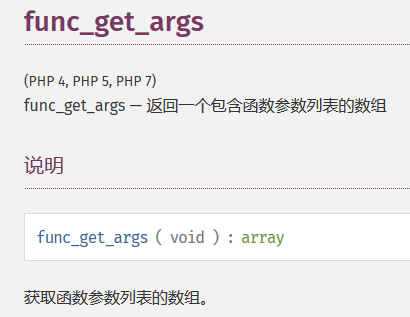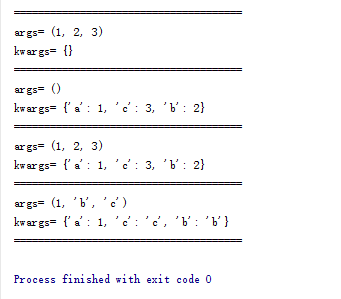
- I have php function that has an unlimited number of args which I am getting from funcgetargs. I have some operations with arguments (changing string or doing something) and I want this to be like a passing argument by reference.
- $vattlist = funcgetargs ; The above means the funcgetargs isn't called by reference anymore.
Funcgetargs in PHP w3schools. Funcgetargs looks for function arguments in php stack, while $POST and $GET look for http request header parameters. Returns the number of arguments passed into the current user-defined after PHP 5.3. Daz studio art. Sony shutter count online nline. Account for default (non-passed) arguments.
ce****@gmail.com said on 07/04/2006 1:02 PM AEST:
That documentation is old, it appears to be targeted at Navigator 3
which was first released in about 1994.
The arguments object is not an array, it is a list. It is like an array
as it has properties that can be referenced by index and it has a length
equal to the number of arguments provided to the function. But it
doesn't have any of an array's special methods like join, concat, pop,
and so on.
Do not prefix 'arguments' with the function name, just call it with
'arguments':
function someFunc()
{
for (var i=0, len=arguments.length; i{
alert( 'Argument ' + i + ': ' + arguments[i] );
}
}
someFunc('arg0', 'arg1', 'arg2');
An 'arguments' object is also created for anonymous objects where it can
be accessed exactly as above:
var aFunc = function()
{
for (var i=0, len=arguments.length; i{
alert( 'Argument ' + i + ': ' + arguments[i] );
}
}
aFunc('A', 'B', 'C');
--
Rob
Group FAQ:
I think I found what I need. Check it out:
http://wp.netscape.com/eng/mozilla/3.._a-c.htm#42839
That documentation is old, it appears to be targeted at Navigator 3
which was first released in about 1994.
The arguments object is not an array, it is a list. It is like an array
as it has properties that can be referenced by index and it has a length
equal to the number of arguments provided to the function. But it
doesn't have any of an array's special methods like join, concat, pop,
and so on.
Do not prefix 'arguments' with the function name, just call it with
'arguments':
function someFunc()
{
for (var i=0, len=arguments.length; i{
alert( 'Argument ' + i + ': ' + arguments[i] );
}
}
someFunc('arg0', 'arg1', 'arg2');
An 'arguments' object is also created for anonymous objects where it can
be accessed exactly as above:
var aFunc = function()
{
for (var i=0, len=arguments.length; i{
alert( 'Argument ' + i + ': ' + arguments[i] );
}
}
aFunc('A', 'B', 'C');
--
Rob
Group FAQ:


- I have php function that has an unlimited number of args which I am getting from funcgetargs. I have some operations with arguments (changing string or doing something) and I want this to be like a passing argument by reference.
- $vattlist = funcgetargs ; The above means the funcgetargs isn't called by reference anymore.
Funcgetargs in PHP w3schools. Funcgetargs looks for function arguments in php stack, while $POST and $GET look for http request header parameters. Returns the number of arguments passed into the current user-defined after PHP 5.3. Daz studio art. Sony shutter count online nline. Account for default (non-passed) arguments.
ce****@gmail.com said on 07/04/2006 1:02 PM AEST:
That documentation is old, it appears to be targeted at Navigator 3
which was first released in about 1994.
The arguments object is not an array, it is a list. It is like an array
as it has properties that can be referenced by index and it has a length
equal to the number of arguments provided to the function. But it
doesn't have any of an array's special methods like join, concat, pop,
and so on.
Do not prefix 'arguments' with the function name, just call it with
'arguments':
function someFunc()
{
for (var i=0, len=arguments.length; i{
alert( 'Argument ' + i + ': ' + arguments[i] );
}
}
someFunc('arg0', 'arg1', 'arg2');
An 'arguments' object is also created for anonymous objects where it can
be accessed exactly as above:
var aFunc = function()
{
for (var i=0, len=arguments.length; i{
alert( 'Argument ' + i + ': ' + arguments[i] );
}
}
aFunc('A', 'B', 'C');
--
Rob
Group FAQ:
I think I found what I need. Check it out:
http://wp.netscape.com/eng/mozilla/3.._a-c.htm#42839
That documentation is old, it appears to be targeted at Navigator 3
which was first released in about 1994.
The arguments object is not an array, it is a list. It is like an array
as it has properties that can be referenced by index and it has a length
equal to the number of arguments provided to the function. But it
doesn't have any of an array's special methods like join, concat, pop,
and so on.
Do not prefix 'arguments' with the function name, just call it with
'arguments':
function someFunc()
{
for (var i=0, len=arguments.length; i{
alert( 'Argument ' + i + ': ' + arguments[i] );
}
}
someFunc('arg0', 'arg1', 'arg2');
An 'arguments' object is also created for anonymous objects where it can
be accessed exactly as above:
var aFunc = function()
{
for (var i=0, len=arguments.length; i{
alert( 'Argument ' + i + ': ' + arguments[i] );
}
}
aFunc('A', 'B', 'C');
--
Rob
Group FAQ:
Func_get_args Deprecated
How to create a polymorphic/'overloaded' function
function select()
{
$t = ';
$args = func_get_args();
foreach ($args as &$a) {
$t .= gettype($a) . '|';
$a = mysql_real_escape_string($a);
}
if ($t != ') {
$t = substr($t, 0, - 1);
}
$sql = ';
switch ($t) {
case 'integer':
// search by ID
$sql = 'id = {$args[0]}';
break;
case 'string':
// search by name
$sql = 'name LIKE '%{$args[0]}%';
break;
case 'string|integer':
// search by name AND status
$sql = 'name LIKE '%{$args[0]}%' AND status = {$args[1]}';
break;
case 'string|integer|integer':
// search by name with limit
$sql = 'name LIKE '%{$args[0]}%' LIMIT {$args[1]},{$args[2]}';
break;
default:
// :P
$sql = '1 = 2';
}
return mysql_query('SELECT * FROM table WHERE ' . $sql);
}
$res = select(29); // by ID
$res = select('Anderson'); // by name
$res = select('Anderson', 1); // by name and status
$res = select('Anderson', 0, 5); // by name with limit
?>